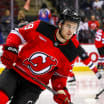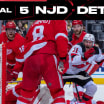June 10th marks 19th anniversary of the New Jersey Devils winning the Stanley Cup over the Dallas Stars. In speaking with three members of that Devils Stanley Cup championship team, Martin Brodeur, Ken Daneyko and Patrik Elias, here are 19 points, 19 years later, about one of the most dramatic Stanley Cup wins in the modern era:
FEATURE: 19 Points About the 19th Anniversary of Devils' 2000 Cup Victory
19 years ago today, Jason Arnott scored his overtime winner to lift the Devils to their second Stanley Cup championship
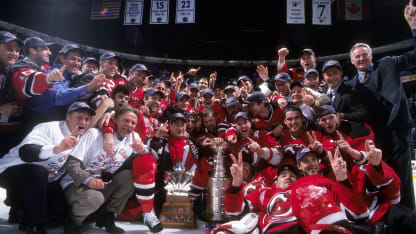
By
Peter Robinson
Special to NewJerseyDevils.com
- The Devils finished 1999-2000 with 103 points, the second-best point total in the Eastern Conference but entered the playoffs a fourth seed under the old seeding format. In a quirky twist, the Devils had home ice advantage in the conference quarterfinals (a sweep of the Florida Panthers) but not again until the Stanley Cup Final against Dallas, who had 102 points during the regular season.
2. Of the Devils' 23 playoff games, 14 were one-goal contests. Just two went to overtime, both against the Stars in the Stanley Cup Final. The Stars won in triple overtime in Game 5 before Jason Arnott's heroics in Game 6.
3. Devils fans likely need no reminder how Arnott's goal was scored. Scott Stevens pinched to keep the puck inside the Stars zone, advanced the puck into the opposite corner, where Elias pounced on it and passed out front. Elias said he neither saw nor heard Arnott calling for the puck but rather that it was more instinct to react to where he thought Arnott would be. "I think it was just intuition," remembers Elias, 19 years later. "Sometimes things just work out perfectly."
Watch: Arnott's Goal
4. Elias says he doesn't obsess over the memory of his first Stanley Cup but recalls it when watching the playoffs or when he's given a specific reminder of it. Perhaps surprisingly, he said the overwhelming emotion that came over him when Arnott scored was more relief than elation. "Sometimes people are surprised to hear that but I was just relieved that it was over and we were able to win," said Elias.
5. Arnott (8G, 12A) and Elias (7G, 13A) both had 20 points in 23 playoff games to lead the Devils. Stevens won the Conn Smythe Trophy. Brodeur posted an incredible 1.61 GAA and .927 SV%.
6. Daneyko was effusive in praising Brodeur for how he allowed the Devils defence corps to play in such a way it gave them an advantage over opponents. "We always knew that he was there with a big stop," said Daneyko, "but also to play the puck. We could go to a spot in our zone where he would give us a tape-to-tape pass…you win and lose as a team but in hockey you need great goaltending to win a championship. The only other sport that is like that is football with a quarterback. Marty always gave us that advantage."
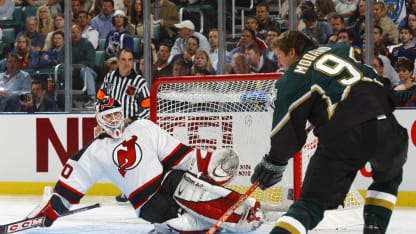
- It's always an event for people from players' hometowns because the Stanley Cup visits when each team member gets his day with the trophy. But it was an especially big deal for Arnott's hometown of Wasaga Beach, Ont.. The beach town is a local tourist mecca but Arnott's goal was by a wide margin the biggest sporting accomplishment by anyone from Wasaga Beach. The Americans and British clashed there during the War of 1812 - a sunken British ship was made into the foundation of a museum. It's not an exaggeration to say that Arnott's goal and the Cup's visit soon after was the biggest development in the town's history ever since.
8. In recognition of its native son's NHL exploits, Wasaga Beach re-ordered addresses on Arnott's street so that his house number would correspond to his jersey number. Arnott now lives in the U.S. but that house sits on the Nottawasaga River, less than a mile upstream from the museum/shipwreck.
9. A famous pic taken from behind Brodeur is one of the iconic images of the winning goal. "I could see the play develop," remembers Brodeur, "so I was able to react pretty quickly when Arny put it in." Brodeur says the image is deceiving. "I didn't jump nearly as high as it looks in that picture."
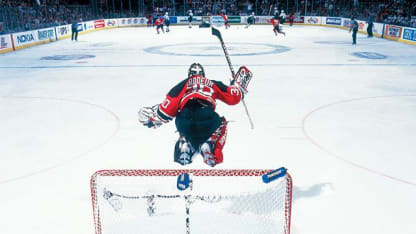
- The victory in 2000 marked the end of a brutally tough playoff run for both the Stars and Devils. The Stars were defending their Stanley Cup title and the Devils played 23 playoff games in 2000, including a triple overtime loss in Game 5 before the double OT victory that won them the Stanley Cup. Difficult wins over Toronto and Philadelphia preceded the six-game victory over Dallas. "Every series has its tipping point," remembers Brodeur, "we were just able to make sure that it was us (creating) it that year. It very easily could have gone the other way against Philadelphia."
11. Brodeur says the Scott Stevens hit on Eric Lindros early in Game 7 that helped the Devils dictate the tempo and tone led to Elias's late winner in the Eastern Conference Final. "You never want to see anyone get hurt," said Brodeur, "But Scott was a tough player and when he saw the opportunity to deliver a hit like that on a good player, and Eric had been playing very good, then he was going to take it." A round earlier, Daneyko cites a dominating Game 6 showing against Toronto as another key step in the journey. "Toronto was a great team. They were skilled, tough and they had a team that could have won the Stanley Cup (but) we dominated Game 6 at home to win that series."
12. The team felt extra motivation in the decisive Game 6 of the Final: to win for Petr Sykora. He had been knocked out of the game in the first period and sent to the hospital, where he was receiving medical attention when Arnott scored. "We wanted to win it for him," said Elias, "we used it as a motivation and we made sure to visit him in the hospital with the Stanley Cup before we went home."
13. Down 3-1 in the Eastern Conference Final against Philadelphia, head coach Larry Robinson, never a big talker, gave an epic speech to his team that laid the groundwork for three straight wins over a very strong Flyers squad. "He just made sure we knew that we were letting a great opportunity pass us by," said Brodeur, sentiment echoed by Daneyko. "He made sure to let us know that he believed in us to (comeback) but that we could believe in ourselves too."
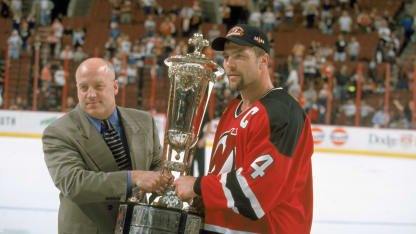
- The mental grind that Devils teams from that era were able to navigate to win three Stanley Cups (1995, 2000, 2003) had similarities to each other but also to times when it didn't result in a Cup win. Despite all the preparation it doesn't always go as planned, as witnessed by fate striking a cruel blow a year later when the Devils were attempting to defend their Stanley Cup crown. They lost in Game 7 to the Colorado Avalanche. "A year earlier we (overcame) a great team in Dallas," remembers Brodeur. "They had Mike Modano, Brett Hull, Eddie (Belfour), The next year Colorado had Joe Sakic, Rob Blake, Patrick Roy…sometimes it's just doesn't work out."
15. The microscopic difference between winning and losing in close championship series such as 2000 and 2001 was perhaps best summed up by Elias. "All the things that go into it, skill, execution, injuries, mental (approach), sometimes it comes down to who makes the bigger mistake at a more important time."
16. It's obvious that Brodeur has a special place for 2000. He pointed out that it marked the "beginning of his prime" with that Cup win, the Olympic gold medal with Team Canada in Salt Lake City and then another Stanley Cup in 2003. Every championship is special for Brodeur. "They are like your kids," he says, "you love them all the same and there are no favorites because every one of them is different."
17. Besides the passage of time, a few other things have changed for Brodeur, Daneyko and Elias since the 2000 Cup win. Back then, Brodeur and Elias spoke in heavily accented English and Daneyko had a full-on Edmonton drawl. Elias and Brodeur now speak flawless English with slight accents, while the more hoser-ish elements of Daneyko's speech have softened. "I've been here 35 years now. My kids tease me," he explained, "they say I don't sound as Canadian as I used to and that they miss it."
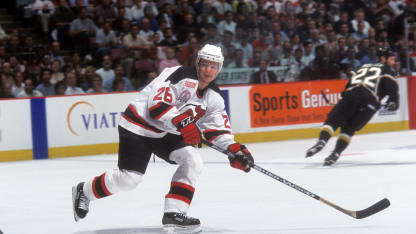
- Arnott later moved to Dallas and then Nashville but returned to New Jersey in a trade that saw Matt Halischuk go the other way. In a quirky twist, Halischuk also scored an important overtime winner while a member of the Devils organization that gave Canada the gold medal at the 2008 World Junior Hockey Championship over Sweden.
19. Many team members from 2000 are helping their children in their athletic careers. Two of Brodeur's sons were goalies; Jeremy was a member of the Oshawa Generals when they won the 2015 Memorial Cup. Anthony Brodeur played for two different Quebec Major Junior Hockey League teams and was a draft pick of the Devils. He is now a two-sport (golf and hockey) athlete at the University of Ottawa and a nationally ranked amateur golfer in Canada. Niedermayer's son, Joshua, was recently the first pick (30th overall) of the Vancouver Giants in the Western Hockey League Bantam Draft. John Madden's son, Tyler, plays at Northeastern University and helped Team USA to a silver medal at the most recent World Juniors. He is a draft pick of the Vancouver Canucks.





